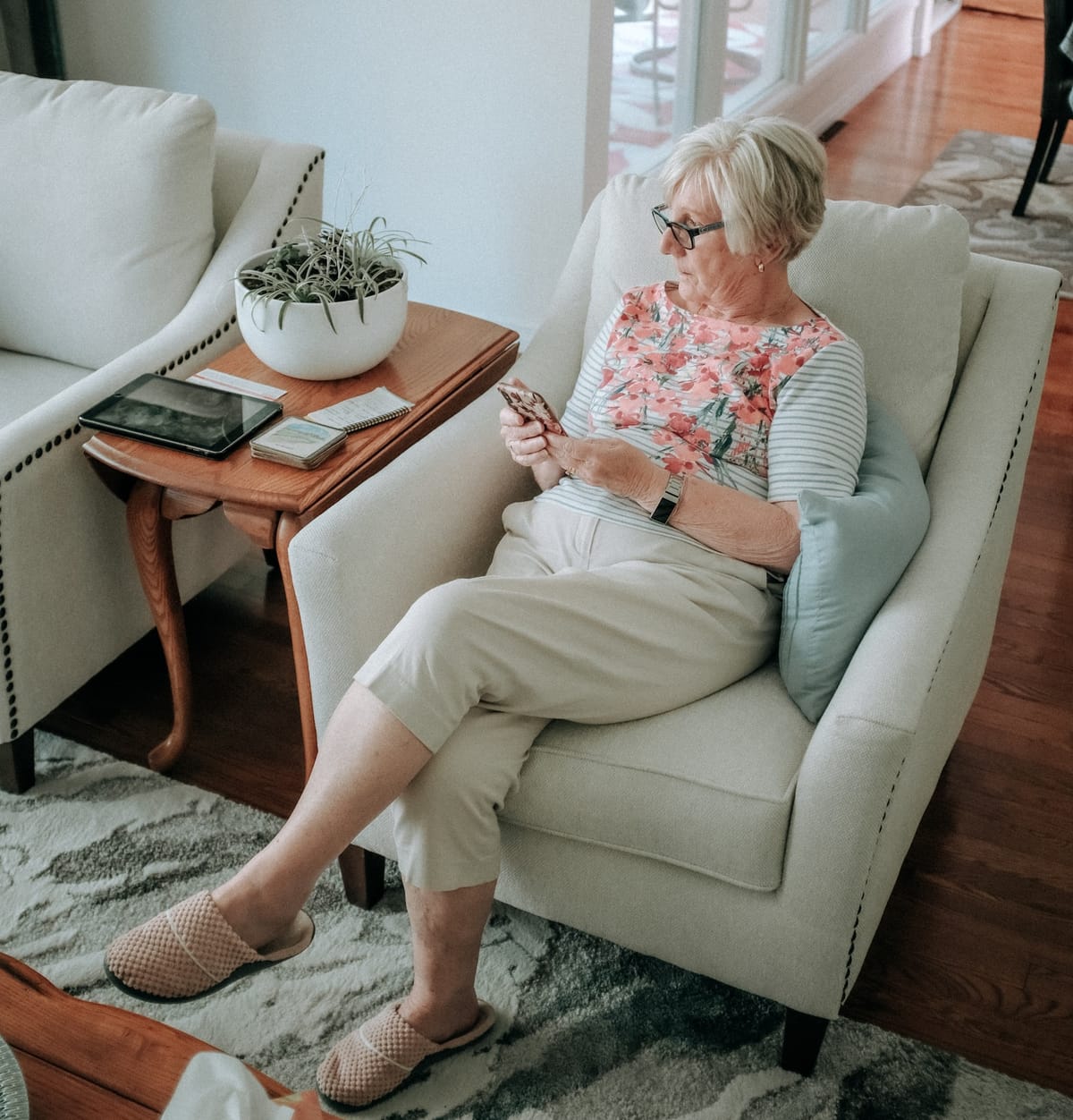What To Do If Your Elderly Parent Is Being Scammed: Protecting Seniors and Caregivers from Social Isolation Scams
Concerned your elderly parent might be a target for scammers? Read our article to learn practical steps to spot red flags, protect finances, and secure their well-being. Empower yourself to prevent future scams and keep your loved ones safe.

Concerned your elderly parent might be a target for scammers? Read our article to learn practical steps to spot red flags, protect finances, and secure their well-being. Empower yourself to prevent future scams and keep your loved ones safe.
Scam Alert
Caregiver social isolation is a topic of deep concern, and I feel compelled to issue a Scam Alert based on recent experiences. A client reached out to me, distressed over a broken heart and a significantly lighter bank account. This individual is a caregiver, often feeling lonely, emotionally drained, and socially isolated, and her primary mode of communication is through the internet.
Why Do Vulnerable Individuals Fall for Scams?
This client, a smart and professional middle-aged woman, maintains a Facebook page and was approached by a man who expressed interest in a romantic relationship. This is a classic example of romance scams, where con artists exploit online dating to target lonely older adults. Over time, she found herself sending him money under the belief that he would reimburse her once they met in person. It’s a story we’ve all heard too often.
Lately, I’ve noticed various posts on my Facebook feed from different men and women expressing frustration about unsolicited advances from individuals seeking relationships. This made me ponder the extent of such scams.
Now, I must confess that I’ve been told throughout my life that I bear a resemblance to the character “Gloria” from the sitcom “Archie Bunker.” At 57 years old, I’m told I resemble Angela Lansbury! Yet, even I receive charming emails proposing relationships.
These emails are quite formulaic, praising my beauty (in an Angela Lansbury kind of way) and expressing fascination with my profile, even though it’s mostly empty, and it used to feature my late son’s picture.
So, with a group of mature female friends, I decided to respond to the next two “advances” we received, mainly for educational purposes. What followed was an enlightening and somewhat unnerving experience.

What we discovered is that there’s a system in place, where individuals—likely both men and women—operate as master manipulators. They feign interest, boost self-esteem, and emphasize the importance of “honesty” in the budding relationship. They try to win your heart, often posing as churchgoers to appear more trustworthy.
All of them push for frequent email communication and chat but discourage Skype or telephone conversations. Phone calls only come into play after they embark on a sudden, overseas trip, and strangely, they expect you to call them because, inexplicably, they can’t make long-distance calls themselves.
As caregivers, loneliness and isolation can lead us to seek companionship. However, we must exercise caution to protect our hearts, wallets, and overall well-being. When in doubt, reach out to someone trustworthy or share your experiences to raise awareness.
It is also crucial to monitor bank accounts and bank statements to protect elderly parents from financial scams. Regularly reviewing these documents can help detect any unauthorized transactions or unusual changes, ensuring their financial security.
Part 2
I will share the responses we received as we played along with these newfound relationships. We started cautiously, expressing our concerns that this might be a scam. Here’s the next response:
“Thanks for the brief introduction about yourself, and I’d like to know more as time progresses. Let’s be friends first and see where this leads. I’m not into cybersex but real friendship.
Allow me to share a bit about me. I was born in Sweden and spent most of my life in Europe before moving to a small town in Halifax, Canada, at age 5. I attended college briefly until financial constraints brought me back home. Tragically, I lost my mother to hypertension, followed by my father after a brief illness.
I work in investment banking with extensive financial advisory and research experience. I’ve served overseas, toured different parts of the world, and been with a large payroll company for over six years.
During the summer, I enjoy hiking, biking, and sports, and I love cooking. I’m part of a slow pitch softball team, but I’ve always lacked a skiing buddy during the winter. I don’t smoke, and I drink socially. I’ve only been with one person, my late wife, who I lost in a tragic accident in Michigan while shopping for her wedding gown on our 3rd anniversary.
My wife’s loss is still a painful reality, and I cherish our time together. Now, I live with my son. Online dating became an option because my uncle found success and remarried using it. He’s my inspiration.
I’m a bit shy initially, but I open up once I get to know people. I need someone with energy in my life, someone who enjoys life as you seem to. I love watching ball games but not for picking up women, as I travel extensively for work.
I’ve always struggled with approaching someone, so I thought I’d give this online avenue a try. The distance between us makes things challenging, but we can learn a lot about each other this way. I promise to be honest and truthful. If I don’t respond today, have a wonderful day, and I’ll talk to you when I’m back home.”
Readers, you’ll notice numerous inconsistencies in this story. Yet, the vulnerable often overlook these details. In the next few days, I’ll share more experiences related to this topic. It’s on the fringes of caregiving, but loneliness often drives us to seek companionship.
Learn About Check Washing
Part 3: Protecting Yourself
As our communication continued, we started asking specific questions about him, his life, and his family. Here’s the response:
“I’m glad to hear from you today. This was my first time on Facebook, and I wanted to give it a try. I’ve seen your profile for a while but wanted to be sure about it. Your beautiful picture caught my attention.
I’ve been thinking about you since I saw your profile. I might be right or wrong about you, but I can’t stop thinking about what I saw. Your profile possesses a magnetic charm that drew my interest and fascination.
My immediate response was driven by spontaneous mutual attraction, rendering me helpless and unable to resist communicating with you. Allow me the opportunity to get to know you better.
Distance isn’t a barrier if our hearts connect, and I don’t see it as an obstacle but a reminder of how strong true love can be. I find your beauty incomparable, and my eyes are set on you.
‘A picture is worth a thousand words,’ and yours left me speechless. Feel free to email me anytime, and take care of yourself for me.”
Larry
For readers, it’s essential to note the exaggeration of charm in this response. Our email response, initially cautious and questioning, seemed to send him dancing, despite our suggestions that he might be a scammer. It’s crucial for vulnerable individuals not to be swayed by sweet words and caring phrases. The goal for these scammers isn’t a genuine relationship; it’s financial gain.
To protect yourself in the realm of online interactions, consider the following tips:
- Limit Personal Information: If using Facebook or other social media, restrict your information and privacy settings to trusted friends only. Avoid posting your whereabouts or activities publicly.
- Use Reputable Dating Sites: If seeking companionship, opt for dating sites that screen their members and have privacy policies in place.
- Be Cautious with Unsolicited Requests: Never respond to unsolicited advances from strangers on social media. These can often lead to scams.
- Maintain Anonymity: Do not reveal identifying information early in your interactions. Create a separate email address for online relationships.
- Request Recent Photos: Ask for recent photos to ensure authenticity. Multiple pictures are even better.
- Take It Slow: Don’t rush into a relationship. Protect your heart, wallet, and overall well-being. Be cautious when something doesn’t feel right.
- Use Video Calls: Whenever possible, opt for video calls through platforms like Skype or Messenger to verify the person’s identity.
- Trust Your Instincts: If something feels off or inconsistent, don’t hesitate to question or cut off contact. Your safety should be your top priority.
- Public Meetings: If you decide to meet in person, choose public places and use your own transportation.
- Inform Trusted People: Always let friends or family know where you are and what your plans are. Check in with them frequently.
- Trust Your Gut: If you feel uneasy or something doesn’t ring true, don’t ignore those feelings.
Remember, in the quest for companionship, your safety and well-being are paramount. Stay vigilant and protect yourself as you navigate the digital world.
Understanding Elder Fraud
Elder fraud is a growing concern that affects millions of older adults worldwide. It involves the exploitation of seniors through various scams, schemes, and deceptive practices, resulting in financial loss, emotional distress, and compromised personal safety. Elder fraud can take many forms, including financial scams, investment scams, identity theft, and government impersonation scams.
Financial scams often involve fraudsters posing as legitimate entities, such as banks or credit card companies, to steal money or sensitive personal information. Investment scams lure seniors with promises of high returns, only to leave them with significant financial losses. Identity theft occurs when scammers steal personal information, such as social security numbers, to commit fraud. Government impersonation scams involve criminals pretending to be from agencies like the Social Security Administration or the Internal Revenue Service to extract money or information.
Understanding these types of elder fraud and how to prevent them is crucial for protecting seniors and their loved ones. By staying informed and vigilant, older adults can safeguard their financial security and personal well-being.
Understanding Elderly Scams: Romance Scams
Elderly scams are a growing concern that affects seniors worldwide. These scams can take many forms, including phone calls, emails, and in-person interactions. Scammers often engage in targeting older adults who are trusting, polite, and kind, and who may be more vulnerable due to cognitive decline or social isolation. It’s essential to understand the tactics used by scammers to protect elderly parents and family members from falling victim to these scams.
Common Scams Targeting Elderly Individuals: Tech Support Scams
There are several common scams that target elderly individuals, including:
- Phone scams: Scammers may call elderly individuals, claiming to be from a legitimate organization, and ask for personal or financial information.
- Tech support scams: Scammers may claim to be from a tech company and ask for access to the elderly individual’s computer or financial information.
- Grandparent scams: Scammers may pose as a grandchild or other family member and ask for money or financial assistance.
- Financial scams: Scammers may offer investment opportunities or promise unusually high returns on investments.
- Elder scams: Scammers may target elderly individuals with scams related to their age, such as Medicare or Social Security scams.
- Lottery scams: Scammers falsely inform victims that they have won a lottery or prize and pressure them to send money upfront for taxes and fees, although no prize is ever delivered, leading to ongoing financial exploitation.
- Remote access: Scammers request remote access to manipulate older individuals' computers, leading to financial losses without consent.
Signs of a Scam
There are several signs that may indicate a scam, including:
- Unsolicited phone calls or emails
- Requests for personal or financial information, such as a social security number
- Pressure to make a decision quickly
- Unusual or suspicious requests for payment
- Lack of transparency or unclear information
If you suspect that an elderly parent or family member is being targeted by a scam, it’s essential to take action quickly.
Reporting the Scam: National Elder Fraud Hotline
If you believe that an elderly parent or family member has fallen victim to suspected fraud, it’s essential to report it to the relevant authorities. You can:
- Contact the National Elder Fraud Hotline at 833-372-8311
- Report the scam to local police
- File a complaint with the Federal Trade Commission (FTC)
- Contact the bank or financial institution to report any suspicious activity
Protecting Elderly Parents from Future Scams and Financial Exploitation
To protect elderly parents from future scams, it's essential to take proactive steps, including:
- Monitoring bank statements and credit reports
- Educating elderly parents about common scams and how to avoid them
- Encouraging elderly parents to be cautious with unsolicited phone calls or emails
- Helping elderly parents to stay connected with friends and family
- Considering professional help from a financial advisor or geriatric care manager
- Setting up a power of attorney to manage financial decisions
- Keeping personal and financial information secure
By taking these steps, you can help protect elderly parents from falling victim to scams and ensure their financial security.
Protecting Seniors from Social Isolation
Social isolation is a significant risk factor for elder fraud. Scammers often target seniors who are lonely, vulnerable, and disconnected from their communities. To protect seniors from social isolation, it’s essential to encourage social interaction, community engagement, and access to resources and support services. This can include:
- Regular phone calls or video chats with family and friends to maintain connections and reduce feelings of loneliness.
- Participation in local community events, clubs, or organizations to foster a sense of belonging and engagement.
- Access to transportation and mobility services to ensure seniors can attend social gatherings and appointments.
- Home visits from healthcare professionals or social workers to provide companionship and monitor well-being.
- Online resources and support groups for seniors to connect with others and share experiences.
By promoting social interaction and community involvement, we can help reduce the vulnerability of seniors to elder fraud and enhance their overall quality of life.
Staying Safe Online
The internet can be a breeding ground for scams and fraud. To stay safe online, seniors should follow these essential tips:
- Be cautious when clicking on links or downloading attachments from unknown sources, as they may contain malware or lead to phishing sites.
- Use strong, unique passwords for different accounts and keep them confidential to prevent unauthorized access.
- Avoid sharing sensitive personal information, such as social security numbers or bank details, online.
- Use reputable antivirus software and keep it up to date to protect against cyber threats.
- Be wary of online scams, such as phishing emails or fake websites, which often seek to steal personal information or money.
- Use two-factor authentication whenever possible to add an extra layer of security to online accounts.
By following these guidelines, seniors can protect themselves from online scams and ensure their digital safety.
Getting Help After a Scam
If you or a loved one has been a victim of a scam, it’s essential to seek help immediately. Here are some steps to take:
- Contact the National Elder Fraud Hotline at 833-372-8311 for guidance and support from trained professionals.
- Report the scam to the Federal Trade Commission (FTC) and the Internet Crime Complaint Center (IC3) to help authorities track and combat fraud.
- Notify your bank, credit card company, and other relevant financial institutions to report any suspicious activity and prevent further financial loss.
- Seek advice from a trusted financial advisor or attorney to understand your options and protect your assets.
- Consider seeking counseling or therapy to cope with the emotional impact of the scam and regain a sense of security.
Taking these steps can help mitigate the damage caused by scams and provide the necessary support to recover and protect against future fraud.
Our Resources section can help you find the information and tools that you need. We have courses, videos, checklists, guidebooks, cheat sheets, how-to guides and more.
You can get started by clicking on the link below. We know that taking care of a loved one is hard work, but with our help you can get the support that you need.
Click here to go to Resources Section now!
You might also like this article:

















